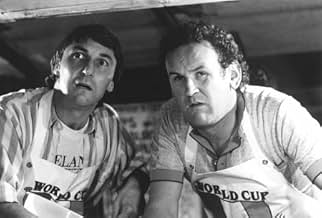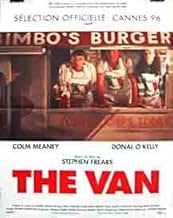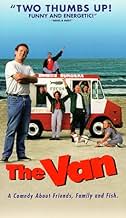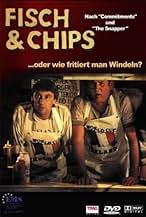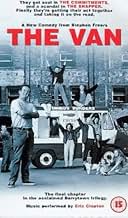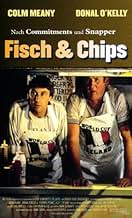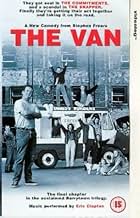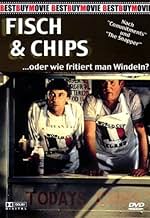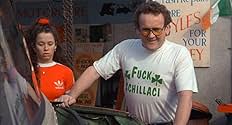PUNTUACIÓN EN IMDb
6,7/10
5 mil
TU PUNTUACIÓN
A Bimbo, un panadero de Barrytown, lo echan del trabajo. Junto con su mejor amigo compra una camioneta para vender comida de forma ambulante. Pero cuanto más prospera el negocio más se deter... Leer todoA Bimbo, un panadero de Barrytown, lo echan del trabajo. Junto con su mejor amigo compra una camioneta para vender comida de forma ambulante. Pero cuanto más prospera el negocio más se deteriora la amistad entre ambos.A Bimbo, un panadero de Barrytown, lo echan del trabajo. Junto con su mejor amigo compra una camioneta para vender comida de forma ambulante. Pero cuanto más prospera el negocio más se deteriora la amistad entre ambos.
- Premios
- 1 nominación en total
Reseñas destacadas
The Van, a 1996 Stephen Frears film who would go on to much better things, takes on the ideas of desperate, inglorious situations and scenarios, such as unemployment, and wraps them up into packages ready to be delivered as comedy. There is nothing at all funny about the situation the two leads in the film find themselves in, but there is something distinctly charming about the way in which they deal with it.
While not essentially British, a given thanks to the over emphasis on how wonderful it was for the characters to witness the Irish football team pull back a goal and hold on for a draw against the English, while most of the other matches go unnoticed. However, it is directed by an Englishman and the film does posses rather a few items that were written about in regards to some growing fears and concerns simmering at the time within the British film industry, with particular attention to the comedy genre. If we recall Claire Monk's writings in the late 1990s, we might think of films such as Brassed Off and The Full Monty as being films depicting jobless British males turning to alternate methods of money making to get by; effectively rendering the crisis of post-industrialism (closure of mines and steel mills) as a crisis of masculinity. She also writes about these films transitioning problematic situations into comic solutions. These ideas and scenarios might be applicable to The Van, a film that spins job-loss and perceived men in crisis into a series of jokes and gags; a film that, like said examples, see the leads turn to either an entertainment or cultural supply and demand industry, in which they eventually come to relish.
One of the two leads in The Van is Bimbo (O'Kelly), a man who has lost his job and gets by off of his redundancy money. The other is Larry (Meaney), and between them, they aim to get a portable fast food outlet up and running. Whilst it's not about becoming strippers or brass-band musicians, it is essentially about two men turning to cooking and meal preparation by way of getting by. Its set up; a male panic, followed by a lot of sitting around complete with head scratching before hitting upon an idea to move into what is a form of the cooking industry, sees the two leads adopt a culinary position; something that Monk may have been alluding two when she describes early 1990s 'new men' as having to now share the once sole motherly burdens; this of course includes cooking and meal preparation. Yes, it's a fast-food van but the progressive realisation that the only way to deal with the 'panic' is to do something thought of initially as somewhat unthinkable and hapless, is certainly explored; the last resort, 'you'll never see me doing that/in one of those things' notion is tested before becoming the source of humour. One character refers to burger vans as portable 'food poisoning', before succumbing to working within one later on.
The van of the title acts as both a physical representation for the nucleus of the two leads' study, but also as a cinematic space in which it is able to play out. When we first encounter the van, it is located in a desolate and sorry place; a place that sees its characters struggle to push their way through all the other hazards around it just to catch a glimpse. The van is broken, worn-out and decrepit – it's seen better days. But the van is transformed; it is updated and goes through a process of modernity before, in time, is back up and running and solving the characters' problems. The process the van goes through is similar to that of the main characters, as these beaten and well-worn individuals whom have seen better days suddenly becoming success stories again; garnering a final day in the sun.
But if The Van is supposed to be a comedy, blending in the harsh and realistic working class life of terrace house living; cramped conditions; redundancy and frustrations with one's overall life with what is, I think, supposed to be a 'feel-good' approach; then it's not a terribly funny one. One of the film's stranger scenes applies a very visceral sense of humour whilst exploiting what little knowledge these perceived men in crisis actually know about the kitchen 'space'; that being when Larry scolds himself whilst trying to deep fry fish and fry eggs, with the fat popping and jumping up onto his forehead and hands thus scolding him. It's an odd scene; a scene in which the male is ill-suited to his culinary surroundings, we are invited to laugh before realising that if he doesn't get back in there, give it another crack and get it right then his life will get doubly worse in an instant.
But The Van has charm, although its charm isn't really enough. It doesn't invite us to laugh at two people on the skids as much as it does invite us to marvel and be entertained at the manner in which they refuse to buckle and hit rock-bottom. The film's humour is too wavy, either settling for scenes in which its characters are under the influence of alcohol or instances in which the burger van is mobbed by a sea of customers all shouting and ordering at once which, and granted, I haven't ordered many meals from many burger vans, but I'm smart enough to know, just doesn't happen. However, you might say its inconsistencies and its broad, uneven feel help in adding to its overall charm of two people just trying to get by; and I wouldn't really begrudge anyone for being fond of it for that.
While not essentially British, a given thanks to the over emphasis on how wonderful it was for the characters to witness the Irish football team pull back a goal and hold on for a draw against the English, while most of the other matches go unnoticed. However, it is directed by an Englishman and the film does posses rather a few items that were written about in regards to some growing fears and concerns simmering at the time within the British film industry, with particular attention to the comedy genre. If we recall Claire Monk's writings in the late 1990s, we might think of films such as Brassed Off and The Full Monty as being films depicting jobless British males turning to alternate methods of money making to get by; effectively rendering the crisis of post-industrialism (closure of mines and steel mills) as a crisis of masculinity. She also writes about these films transitioning problematic situations into comic solutions. These ideas and scenarios might be applicable to The Van, a film that spins job-loss and perceived men in crisis into a series of jokes and gags; a film that, like said examples, see the leads turn to either an entertainment or cultural supply and demand industry, in which they eventually come to relish.
One of the two leads in The Van is Bimbo (O'Kelly), a man who has lost his job and gets by off of his redundancy money. The other is Larry (Meaney), and between them, they aim to get a portable fast food outlet up and running. Whilst it's not about becoming strippers or brass-band musicians, it is essentially about two men turning to cooking and meal preparation by way of getting by. Its set up; a male panic, followed by a lot of sitting around complete with head scratching before hitting upon an idea to move into what is a form of the cooking industry, sees the two leads adopt a culinary position; something that Monk may have been alluding two when she describes early 1990s 'new men' as having to now share the once sole motherly burdens; this of course includes cooking and meal preparation. Yes, it's a fast-food van but the progressive realisation that the only way to deal with the 'panic' is to do something thought of initially as somewhat unthinkable and hapless, is certainly explored; the last resort, 'you'll never see me doing that/in one of those things' notion is tested before becoming the source of humour. One character refers to burger vans as portable 'food poisoning', before succumbing to working within one later on.
The van of the title acts as both a physical representation for the nucleus of the two leads' study, but also as a cinematic space in which it is able to play out. When we first encounter the van, it is located in a desolate and sorry place; a place that sees its characters struggle to push their way through all the other hazards around it just to catch a glimpse. The van is broken, worn-out and decrepit – it's seen better days. But the van is transformed; it is updated and goes through a process of modernity before, in time, is back up and running and solving the characters' problems. The process the van goes through is similar to that of the main characters, as these beaten and well-worn individuals whom have seen better days suddenly becoming success stories again; garnering a final day in the sun.
But if The Van is supposed to be a comedy, blending in the harsh and realistic working class life of terrace house living; cramped conditions; redundancy and frustrations with one's overall life with what is, I think, supposed to be a 'feel-good' approach; then it's not a terribly funny one. One of the film's stranger scenes applies a very visceral sense of humour whilst exploiting what little knowledge these perceived men in crisis actually know about the kitchen 'space'; that being when Larry scolds himself whilst trying to deep fry fish and fry eggs, with the fat popping and jumping up onto his forehead and hands thus scolding him. It's an odd scene; a scene in which the male is ill-suited to his culinary surroundings, we are invited to laugh before realising that if he doesn't get back in there, give it another crack and get it right then his life will get doubly worse in an instant.
But The Van has charm, although its charm isn't really enough. It doesn't invite us to laugh at two people on the skids as much as it does invite us to marvel and be entertained at the manner in which they refuse to buckle and hit rock-bottom. The film's humour is too wavy, either settling for scenes in which its characters are under the influence of alcohol or instances in which the burger van is mobbed by a sea of customers all shouting and ordering at once which, and granted, I haven't ordered many meals from many burger vans, but I'm smart enough to know, just doesn't happen. However, you might say its inconsistencies and its broad, uneven feel help in adding to its overall charm of two people just trying to get by; and I wouldn't really begrudge anyone for being fond of it for that.
When Brenda 'Bimbo' Reeves is laid off he finds himself on the dole and irking out a unfulfilling life with friend Larry. When a 'friend' sells them a clapped out old chip van Bimbo and Larry decide to make a go of it and, once they have removed an inch of grease from the van and worked out how to move it without an engine, they are in business. With the pubs crammed due to the 1990 World Cup, business looks great and, as Ireland continue to win their way through the tournament, things just look like getting better and better.
Being from Northern Ireland myself, I always find something to like in Doyle's very typical delivery and, as such, will always give the films adapted from his work a try. With The Van doing average business in the cinemas, I had to wait till it came onto television before I could get a chance to see it and it was as I expected, an enjoyable working-class fable of friendship set against the backdrop of unemployment. As such it is pretty good providing good humour throughout as well as a nice build of tension between the two friends. What I didn't think it did very well was deliver something beyond the boundaries the film had set itself. By this I mean I had expected that the film would be more realistic whereas it really was more of a fable with a moral about friendship over money; it is not a bad thing that it did this but the film could have been stronger with it in my opinion.
However, for what it tries to do it manages to be slight but amusing with a good little turn into the dramatic towards the end to set up the lesson for the day. The cast fit the bill for this type of material as well; Meaney may well have been in several big American hits but he is more at home here and he is a totally convincing working class Irish man. O'Kelly is just as good for different reasons he is the same class but one who thought he was out; maybe you need to have lived around these sorts of areas but I thought he was realistic enough. The two have good chemistry and the support cast are also good value.
Overall this is not the best of Doyle's films but it is an enjoyable little slice of Irish life albeit very simplified and served up in a sauce of cheerful poverty. The script doesn't go deeper than the superficial issues of friendship but this still work well enough and they produce an enjoyable little Irish fable that is amusing as it delivers a lesson about friendship that is thankfully free of sentimentality or slush.
Being from Northern Ireland myself, I always find something to like in Doyle's very typical delivery and, as such, will always give the films adapted from his work a try. With The Van doing average business in the cinemas, I had to wait till it came onto television before I could get a chance to see it and it was as I expected, an enjoyable working-class fable of friendship set against the backdrop of unemployment. As such it is pretty good providing good humour throughout as well as a nice build of tension between the two friends. What I didn't think it did very well was deliver something beyond the boundaries the film had set itself. By this I mean I had expected that the film would be more realistic whereas it really was more of a fable with a moral about friendship over money; it is not a bad thing that it did this but the film could have been stronger with it in my opinion.
However, for what it tries to do it manages to be slight but amusing with a good little turn into the dramatic towards the end to set up the lesson for the day. The cast fit the bill for this type of material as well; Meaney may well have been in several big American hits but he is more at home here and he is a totally convincing working class Irish man. O'Kelly is just as good for different reasons he is the same class but one who thought he was out; maybe you need to have lived around these sorts of areas but I thought he was realistic enough. The two have good chemistry and the support cast are also good value.
Overall this is not the best of Doyle's films but it is an enjoyable little slice of Irish life albeit very simplified and served up in a sauce of cheerful poverty. The script doesn't go deeper than the superficial issues of friendship but this still work well enough and they produce an enjoyable little Irish fable that is amusing as it delivers a lesson about friendship that is thankfully free of sentimentality or slush.
Two Irish men with wives and children find themselves on the dole. One of them buys a large van and turns it into a "chippy." Naturally, he asks his best friend to work there with him. These two approaching-middle-age men have to work incredibly hard, but do have some success at the venture. It doesn't take long, however, for the friendship to get in the way. The one who fronted the money for the van is the boss, and the other one who didn't put up any money to get the small business going is the employee, who eventually becomes bitter at drawing a weekly paycheck from his best friend, who joins a union and begins antagonizing his best friend about labor laws, and whose insecurity in life shows clearly -- after all, the job isn't glamorous by any means, and of course, the reality of it is far removed from his dreams, we should imagine. The tension grows between the two. Set in Ireland during a World Cup Finals competition in soccer, this film gives us an intimate, grungy peek at the everyday realities of the poor in Ireland. It's "grand" to venture forth and set up one's own business and get off the dole, but of course, things are unlikely to run smoothly.
In November 1989, in Ireland, the baker Bimbo (Donal O'Kelly) is fired from his job and he does not feel comfortable with the situation. His best friend Larry (Colm Meaney), who is also unemployed and living with his low welfare with his wife Mary (Caroline Rothwell) and their children, is resigned with his situation and tries to console his friend. But Bimbo is supported by his wife Maggie (Ger Ryan) and decides to buy an abandoned van without engine in a junkyard to open a business of hamburger, French fries and fried codfish and invites Larry to work with him. Soon they have financial success but their friendship is compromised.
"The Van" is a dramatic comedy directed by Stephen Frears that has a funny and exciting beginning and an unpleasant conclusion. The friendship of Larry and Bimbo is beautiful to see and their success is what every viewer expects to see. However, the final twist with the attitude of the big-mouth and envious Larry is disappointing. Maybe the bitter story is more realistic this way but I would prefer a happy ending, valuating friendship and hard work. My vote is five.
Title (Brazil): "A Van" ("The Van")
"The Van" is a dramatic comedy directed by Stephen Frears that has a funny and exciting beginning and an unpleasant conclusion. The friendship of Larry and Bimbo is beautiful to see and their success is what every viewer expects to see. However, the final twist with the attitude of the big-mouth and envious Larry is disappointing. Maybe the bitter story is more realistic this way but I would prefer a happy ending, valuating friendship and hard work. My vote is five.
Title (Brazil): "A Van" ("The Van")
The Van is directed by Stephen Frears and written by Roddy Doyle. It stars Colm Meaney, Donal O'Kelly, Ger Ryan and Caroline Rothwell. Music is by Eric Clapton and Richard Hartley and cinematography by Oliver Stapleton. It is the third film in Roddy Doyle's Barrytown Trilogy, it was preceded by The Comittments and The Snapper. Plot sees Meaney and O'Kelly as best pals who after struggling with unemployment decide to do up an old fast food van and make a living out of selling burgers and chips. Initially it's a fulsome venture as the country is taken over mu football fervour during the 1990 World Cup finals in Italy, but it's not long before cracks begin to appear in the two friends' relationship.
Often raucous and very funny, with deft moments of human drama, The Van is an entertaining picture if one can get past the stereotypes. Meaney dominates proceedings, not just because of his acting gusto, but because he gets to shout all the best lines! The spectre of unemployment is given an assured telling by Frears, and the impact of Ireland's football team on the community is most telling, but there is barely enough material to cover the 100 minutes running time, meaning that entering the final stretch, as the story goes serious, it begins to run out of petrol. Still, the good will garnered during the best scenes in the van more than make it a safe recommendation for adults who like a bit of Oirish mirth. 7/10
Often raucous and very funny, with deft moments of human drama, The Van is an entertaining picture if one can get past the stereotypes. Meaney dominates proceedings, not just because of his acting gusto, but because he gets to shout all the best lines! The spectre of unemployment is given an assured telling by Frears, and the impact of Ireland's football team on the community is most telling, but there is barely enough material to cover the 100 minutes running time, meaning that entering the final stretch, as the story goes serious, it begins to run out of petrol. Still, the good will garnered during the best scenes in the van more than make it a safe recommendation for adults who like a bit of Oirish mirth. 7/10
¿Sabías que...?
- CuriosidadesThis is the third story in Roddy Doyle's "Barrytown Trilogy", following the adventures of the Rabbitte family. However, as 20th Century Fox owned the film rights to the Rabbitte name (from The Commitments), the characters had to be re-named in the subsequent film adaptations (The Snapper, The Van).
- PifiasThe movie is set during World Cup 1990, and on at least two occasions, the radio can be heard promoting 98FM. This station did not use this branding until the mid 1990s; it was called Classic Hits at the time.
- Versiones alternativasIn the UK in 2007 a re-edited version was passed for certification for video release by the BBFC running at 92 minutes 50 seconds, some 3 minutes 55 seconds shorter than the normal theatrical version.
- Banda sonoraWand'rin' Star
Words by Alan Jay Lerner
Music by Frederick Loewe
© Alan Jay Lerner/Frederick Loewe/Chappell & Co Inc
By Kind Permission of Warner Chappell Music Limited
Selecciones populares
Inicia sesión para calificar y añadir a tu lista para recibir recomendaciones personalizadas
- How long is The Van?Con tecnología de Alexa
Detalles
- Fecha de lanzamiento
- Países de origen
- Sitio oficial
- Idioma
- Títulos en diferentes países
- The Van
- Localizaciones del rodaje
- Empresas productoras
- Ver más compañías en los créditos en IMDbPro
Taquilla
- Recaudación en Estados Unidos y Canadá
- 712.095 US$
- Fin de semana de estreno en EE. UU. y Canadá
- 23.366 US$
- 18 may 1997
- Recaudación en todo el mundo
- 714.197 US$
- Duración1 hora 40 minutos
- Color
- Mezcla de sonido
- Relación de aspecto
- 1.85 : 1
Contribuir a esta página
Sugerir un cambio o añadir el contenido que falta

Principal laguna de datos
What is the French language plot outline for La camioneta (The Van) (1996)?
Responde

